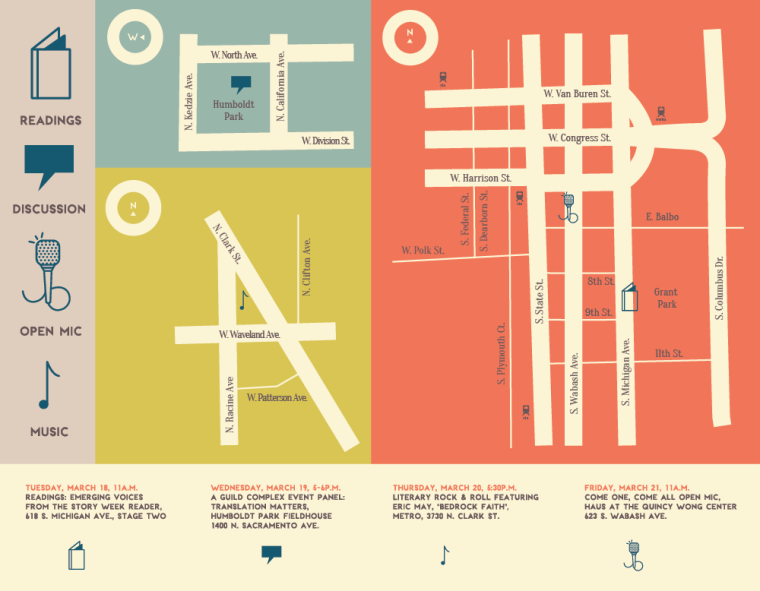Story Week embraces diverse narratives
March 10, 2014

Story Week Preview
Columbia is starting a new chapter with its 18th installment of the Story Week Festival of Writers, an annual citywide event that highlights emerging and established writers.
This year’s theme is DiverCity: Urban Stories. The free festival, which will take place around the city from March 16–21, will exhibit works from authors of various backgrounds that reflect Chicago’s range of cultures, according to Randall Albers, chair emeritus and professor in the Creative Writing Department. The events will feature writers whose literary work explores Caribbean and Latino perspectives, he said.
“We wanted to particularly highlight the potential greatness that could come with diversity,” Albers said. “I’d like people to walk away having been entertained but also prompted to think in new ways, not only about writing but about living.”
Some of this year’s events include Second Story, Literary Rock & Roll, and boot camps with publishing professionals. The events will highlight accomplished professionals such as Kimberly Senior, director of the Pulitzer Prize-winning play “Disgraced” and Christine Sneed, writer and 2013 winner of the Chicago Public Library Foundation’s 21st Century Award.
Albers founded Story Week in 1997 to bring professional writers to campus to interact with students. He said the festival was only scheduled for that first year, but members of the Illinois Arts Council attended the event and encouraged the college to apply for a grant to expand it.
After the first Story Week’s warm reception, Albers said he held a second Story Week and has continued the festival every year since. Annual attendance ranges from 2,600 to 6,000, he said.
Story Week received funding from the Richard H. Driehaus Foundation’s MacArthur Fund for Arts & Culture, the Chicago Community Trust, the Illinois Art Council and the Illinois Humanities Council, amounting to approximately $50,000 for this year, according to Albers. Grants from these nonprofit organizations have allowed the festival to remain open to the public and expand programming, Albers said.
“It’s been very important to me to keep [Story Week] a free festival because we regard it as a populous festival and we want to appeal to the widest possible audience,” Albers said.
Several of this year’s visitors are returning from previous Story Weeks. Cristina Garcia, award-winning novelist and former Miami bureau chief for Time Magazine, said she participated in the 2008 festival and is delighted to return this year.
Garcia’s previous works, such as “Dreaming in Cuban” and “The Lady Matador’s Hotel,” address Latin American issues, which coincides with this year’s festival theme. This year, she plans to read and discuss her latest novel “King of Cuba,” a work describing the life of a fictional Cuban dictator.
Other authors are scheduled to present their novels in the festival for the first time. On March 4, Eric May, associate professor in the Creative Writing Department, released his first published novel, “Bedrock Faith,” a story describing the return of 31-year-old Gerald “Stew Pot” Reeves after serving a 14-year prison sentence.
May is also scheduled to participate in the Literary Rock & Roll event March 20 at the Metro, 3730 N. Clark St., a mash up of spoken word, music and dancing.
Writer, novelist and screenwriter Gifford said he does not know what to expect from the festival but looks forward to discussing his screenwriting and his novel “The Roy Stories,” which chronicles one of his more noted characters, Roy, in the 1940s and 50s in Chicago and Southern Florida.
Johnston said she has participated in the festival since 1998 and the spirit of the festival keeps her coming back.
“It’s like a citywide celebration of the written and spoken word,” Johnston said. “There’s something about Story Week … where people are just having fun, and I guess that’s what keeps me involved in it every year.”
Story Week received funding from the Richard H. Driehaus Foundation’s MacArthur Fund for Arts & Culture, the Chicago Community Trust, the Illinois Arts Council and the Illinois Humanities Council, amounting to approximately $50,000 this year, according to Albers. Grants from these nonprofit organizations have allowed the festival to remain open to the public and expand programming, he added.
“It’s been very important to me to keep [Story Week] a free festival because we regard it as a [inclusionary] festival and we want to appeal to the widest possible audience,” Albers said.
Several of this year’s visitors are returning from previous Story Week festivals. Cristina Garcia, award-winning novelist and former Miami bureau chief for Time magazine, said she participated in the 2008 festival and is delighted to return this year.
Garcia’s previous works, such as “Dreaming in Cuban” and “The Lady Matador’s Hotel,” address Latin American issues, which coincide with this year’s festival theme. Garcia plans to read and discuss her latest novel, “King of Cuba” a work describing the life of a fictional Cuban dictator, during the Reading, Conversation, and Book Signing event at the Harold Washington Library, 400 S. State St.
On March 4, Eric May, associate professor in the Creative Writing Department, released his first published novel, “Bedrock Faith,” a story describing the release of 31-year-old Gerald “Stew Pot” Reeves from prison after a 14-year sentence.
May is also scheduled to participate in the Literary Rock & Roll event March 20 at the Metro, 3730 N. Clark St., a mash–up of spoken word, music and dance performances.
Writer, novelist and screenwriter Gifford said he does not know what to expect from the festival but looks forward to discussing his screenwriting and his novel “The Roy Stories,” which chronicles one of his more notable characters, Roy, in 1940s and 1950s Chicago and Southern Florida.
Johnston said she has participated in the festival since 1998 and its spirit is what keeps her coming back.
“It’s like a citywide celebration of the written and spoken word,” Johnston said. “There’s something about Story Week … where people are just having fun, and I guess that’s what keeps me involved in it every year.”







